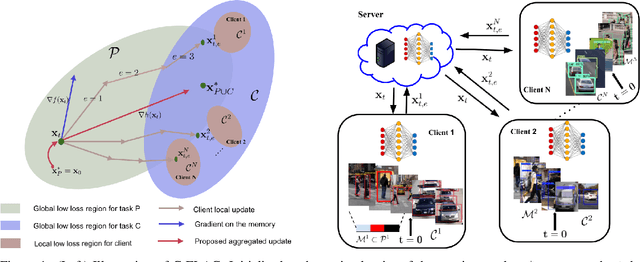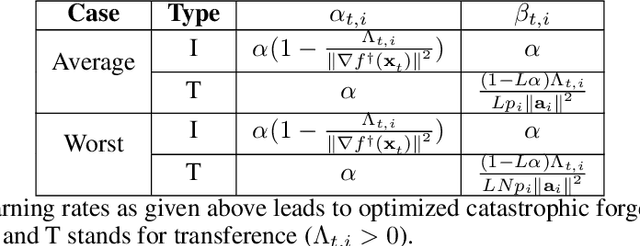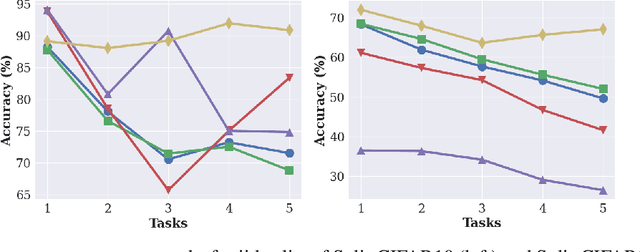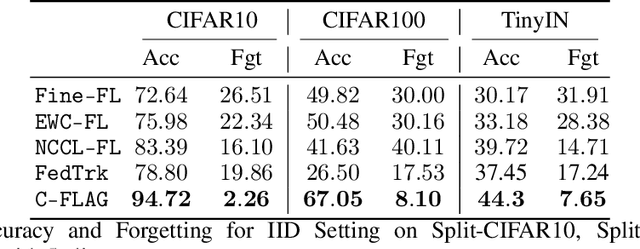Nazreen Shah
Noise Resilient Over-The-Air Federated Learning In Heterogeneous Wireless Networks
Mar 25, 2025



Abstract:In 6G wireless networks, Artificial Intelligence (AI)-driven applications demand the adoption of Federated Learning (FL) to enable efficient and privacy-preserving model training across distributed devices. Over-The-Air Federated Learning (OTA-FL) exploits the superposition property of multiple access channels, allowing edge users in 6G networks to efficiently share spectral resources and perform low-latency global model aggregation. However, these advantages come with challenges, as traditional OTA-FL techniques suffer due to the joint effects of Additive White Gaussian Noise (AWGN) at the server, fading, and both data and system heterogeneity at the participating edge devices. In this work, we propose the novel Noise Resilient Over-the-Air Federated Learning (NoROTA-FL) framework to jointly tackle these challenges in federated wireless networks. In NoROTA-FL, the local optimization problems find controlled inexact solutions, which manifests as an additional proximal constraint at the clients. This approach provides robustness against straggler-induced partial work, heterogeneity, noise, and fading. From a theoretical perspective, we leverage the zeroth- and first-order inexactness and establish convergence guarantees for non-convex optimization problems in the presence of heterogeneous data and varying system capabilities. Experimentally, we validate NoROTA-FL on real-world datasets, including FEMNIST, CIFAR10, and CIFAR100, demonstrating its robustness in noisy and heterogeneous environments. Compared to state-of-the-art baselines such as COTAF and FedProx, NoROTA-FL achieves significantly more stable convergence and higher accuracy, particularly in the presence of stragglers.
On the Convergence of Continual Federated Learning Using Incrementally Aggregated Gradients
Nov 12, 2024



Abstract:The holy grail of machine learning is to enable Continual Federated Learning (CFL) to enhance the efficiency, privacy, and scalability of AI systems while learning from streaming data. The primary challenge of a CFL system is to overcome global catastrophic forgetting, wherein the accuracy of the global model trained on new tasks declines on the old tasks. In this work, we propose Continual Federated Learning with Aggregated Gradients (C-FLAG), a novel replay-memory based federated strategy consisting of edge-based gradient updates on memory and aggregated gradients on the current data. We provide convergence analysis of the C-FLAG approach which addresses forgetting and bias while converging at a rate of $O(1/\sqrt{T})$ over $T$ communication rounds. We formulate an optimization sub-problem that minimizes catastrophic forgetting, translating CFL into an iterative algorithm with adaptive learning rates that ensure seamless learning across tasks. We empirically show that C-FLAG outperforms several state-of-the-art baselines on both task and class-incremental settings with respect to metrics such as accuracy and forgetting.
Over-The-Air Clustered Wireless Federated Learning
Nov 08, 2022Abstract:Privacy, security, and bandwidth constraints have led to federated learning (FL) in wireless systems, where training a machine learning (ML) model is accomplished collaboratively without sharing raw data. Often, such collaborative FL strategies necessitate model aggregation at a server. On the other hand, decentralized FL necessitates that participating clients reach a consensus ML model by exchanging parameter updates. In this work, we propose the over-the-air clustered wireless FL (CWFL) strategy, which eliminates the need for a strong central server and yet achieves an accuracy similar to the server-based strategy while using fewer channel uses as compared to decentralized FL. We theoretically show that the convergence rate of CWFL per cluster is O(1/T) while mitigating the impact of noise. Using the MNIST and CIFAR datasets, we demonstrate the accuracy performance of CWFL for the different number of clusters across communication rounds.
 Add to Chrome
Add to Chrome Add to Firefox
Add to Firefox Add to Edge
Add to Edge